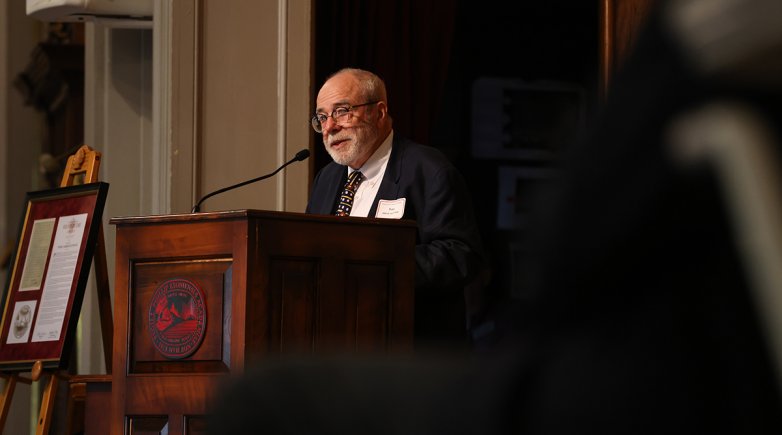Former trustee receives Founders’ Day Award in assembly

Peter Aldrich ’62 encourages students to embrace failure and focus on relationships.
First as a student, and later as a dedicated alumni volunteer and parent to two Exonians, Peter Aldrich ’62; P’99, P’03 has made his mark on the Academy over more than six decades. Yet perhaps nowhere was his impact more felt than on Exeter’s buildings and grounds, the responsible maintenance of which he championed during a decade of service on the Trustees, from 1987 to 1997.
“As a trustee, you applied your intellect, curiosity and boundless energy to the vital task of preserving Exeter’s buildings for future generations of students and faculty,” Betsy Fleming ’86, president of the General Alumni Association, said when presenting Aldrich with the 2024 Founders’ Day Award in front of an audience of students, faculty, alumni and Trustees in the Assembly Hall.
Established by the Trustees in 1976 — and renamed in 2019 to honor the role of both John and Elizabeth Phillips in the school’s formation — the Founders’ Day Award is given annually in recognition of longtime service to the Academy. Six former winners sat on the stage with Principal Bill Rawson ’71; P’08 and Exeter’s current Trustees to watch Aldrich accept the award: Kendra Stearns O’Donnell ’31, ’47, ’63,’91, ’97 (Hon.); P’00; Rick Mahoney ’61; ’74, ’95 (Hon.); P’88, P’92; David Bohn ’57; P’81, P’84, P’90; Jim Theisen ’40, ’45, ’52, ’66 (Hon.); P’97; Alan Jones ’72; and Rich Aaronian 76, ’78, ’97 (Hon.); P’94, P’97.
Fleming spoke of how Aldrich began his service to the school in the 1970s, serving on the Long Step Forward capital campaign, among other roles. To his role as trustee and chair of the Buildings and Ground Committee, he brought knowledge drawn from his own experiences founding and running businesses, especially the real estate investment advisory AEW Capital Management.
“You noted the amount of deferred maintenance on Exeter’s hundreds of buildings, including leaking roofs and crumbling foundations, and helped implement the comprehensive facilities assessment procedure the school uses today,” Fleming said.
With Aldrich’s guidance, she explained, the Trustees also embraced his motto of “no net new space,” meaning that for every new building that was built on campus an equivalent amount of square footage must be decommissioned. They also ratified a funding policy for capital projects dictating that funds raised for every new building must cover 130% of the cost, ensuring the maintenance of the building in the years to come.
In accepting the Founders’ Day Award, Aldrich spoke of his fortunate upbringing in a large, affluent family in Wellesley, Massachusetts, and his longstanding desire to prove himself worthy of the privilege he’d been afforded. “I knew I had to earn the many advantages I had,” he told the audience in Assembly Hall.
At Exeter, that feeling led him to establish the school’s Peace Corps Program in 1961, inspired by John F. Kennedy’s challenge to college students to live and work in developing countries. He served in the Peace Corps after graduating from Harvard, living abroad in the Philippines. At Harvard Business School, he embraced an entrepreneurial drive, and founded his first business shortly afterward. When that first business failed a few years in, he said, he embarked on a cross-country motorcycle trip with his wife, Widgie, who was in the audience along with a number of Aldrich’s friends and family members.
“It ultimately came to me that the most important thing in life for me was relationships,” Aldrich said. “I had a new perspective when I came back from that camping trip.”
Despite the eventual success of AEW Capital Management and other ventures, Aldrich emphasized the number of times he had failed over the course of his career. He used these experiences to offer some words of wisdom to the younger Exonians in the audience, particularly members of the Class of 2024.
“If you don’t have failures, if you’re just rocketing through life with everything going well, someday you’re going to meet a real crisis and it’ll be hard for you,” he said. “But if you have failed and think about it and try to learn from it, I think you’ll be just fine.”